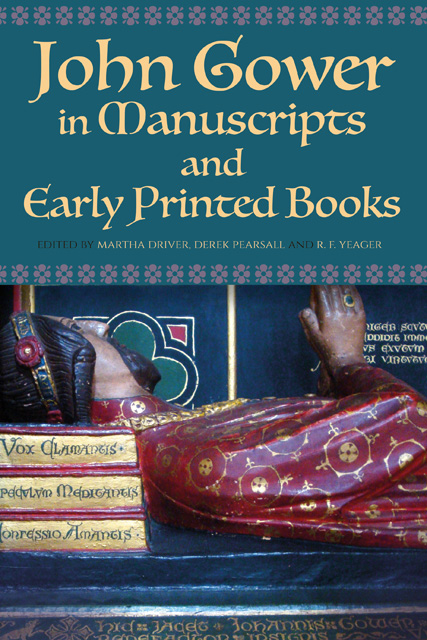2 - Looking for Richard: Finding “Moral Gower” in Oxford, Bodleian Library, MS Hatton 92
Published online by Cambridge University Press: 18 January 2023
Summary
Whence “moral Gower”? WE have, of course, the (in)famous dedicatory lines of Chaucer’s Troilus and Criseyde:
O moral Gower, this book I directe
To the and to the, philosophical Strode,
To vouchen sauf, ther need is, to correcte,
Of youre benignities and zeles good. (V.1856–69)
We also have the numerous critical accounts, both documentary and deconstructive, that have addressed the ramifications and durability of the epithet in scholarly conversations about Gower and his writings. I, however, would like to place this persistent label not in the work of Gower’s friend, nor in Gower’s corpus directly, but in the rather less exalted pages of MS Hatton 92. The manuscript is of note to Gower scholars inasmuch as it contains a copy of the Cronica Tripertita (the Z-text), which, as an early witness to the poem, serves as the base manuscript for the most recent edition of the text, edited by David Carlson. MS Hatton 92 is an eclectic compilation, including the condemnation of a rare English heresy concerning Mary Salome and the Trinubium Annae, a series of epistles and verses exchanged between two church officials regarding said heresy, two moralized excerpts from Ovid in prose and verse, axioms on a range of moral subjects, a collection of Latin metrical proverbs, a series of fables and parables from an array of authors, and a copy of the statutes of an unnamed Bishop of Winchester. Among these we also find Gower’s versified account of the last days of Richard’s reign, coupled with several of his shorter Latin poems (“H. aquile pullus,” “O recolende,” “Rex celi deus,” and a fragment of “Quicquid homo scribat”). The manuscript does not contain the Vox Clamantis, as MS Hatton 92 is the only extant version of the Cronica that survives decoupled from Gower’s longer Latin work. The presence of Gower’s unaccompanied poem in this miscellany is something of an unexpected one, and while some effort has been made to streamline the transition between the Cronica and the surrounding materials, the difference between the verse-chronicle and its neighbors is striking. Moreover, as the manuscript as a whole is written in a series of highly abbreviated fifteenth-century hands, on parchment that has been well-used, and with binding effects that seem opportunistic rather than intentional, the physical object of MS Hatton 92
- Type
- Chapter
- Information
- John Gower in Manuscripts and Early Printed Books , pp. 33 - 54Publisher: Boydell & BrewerPrint publication year: 2020



